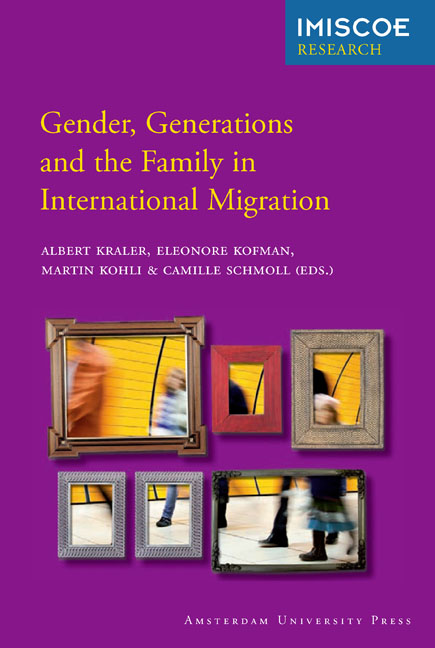Book contents
- Frontmatter
- Contents
- Preface
- 1 Introduction: Issues and Debates on Family-Related Migration and the Migrant Family: A European Perspective
- Section I The Family as a Moral and Social Order
- Section II Gender, Generation and Work in the Migrant Family
- Section III Marriage Migration and Gender Relations
- Section IV Transnational Family Lives and Practices
- List of Contributors
- Index
- Other IMISCOE titles
13 - Civic Stratification, Stratified Reproduction and Family Solidarity: Strategies of Latino Families in Milan
Published online by Cambridge University Press: 21 January 2021
- Frontmatter
- Contents
- Preface
- 1 Introduction: Issues and Debates on Family-Related Migration and the Migrant Family: A European Perspective
- Section I The Family as a Moral and Social Order
- Section II Gender, Generation and Work in the Migrant Family
- Section III Marriage Migration and Gender Relations
- Section IV Transnational Family Lives and Practices
- List of Contributors
- Index
- Other IMISCOE titles
Summary
Introduction
Despite a strong discourse of closure that progressively spread across all European Union countries from the 1970s onward, migration in Europe still persists in a variety of forms. Migrants comprise the professional and technical elite, families, asylum seekers, seasonal workers, undocumented persons and EU and non-EU citizens. This range reflects a stratification of statuses and belongings, a system that Morris (2000), following Lockwood, calls civic stratification: a structure of inequalities of access to the freedom of movement and rights that represents the prevalent modality of managing migration in European countries. The process of assigning different sets of rights to people with respect to their status (long-term resident, national or European citizen, family migrant, guest worker…) generates a complex scenario of partial inclusions together with – and despite – statements and proposals for equal treatment. A selective conceding of rights qualifies as a kind of governance; both surveillance and control are gained through building these ‘internal frontiers’, which become increasingly strategic as the ‘external’ ones – namely, border controls – tend to manifest weakness. This system aims to reconcile contradictory tensions: the will to open borders and create more inclusive patterns, both for economic and demographic reasons and as a consequence of ‘embedded liberalism’, clashes with the safety sphere in terms of social security and social order. A pivotal role is the one played by family reunification policies, the right to which, I will show in this chapter, becomes conditional and stratified. Nationality as well as social and economical resources are laid down as conditions for access in national policies to limit the risk of an uncontrolled, unselected growth of migration flows.
The objective of this chapter is to highlight the multi-layered borders Latin American immigrants face during the process of family separation and reunification in their migration to Italy. I will focus on the forces that jeopardise migrants’ capabilities to reproduce their families, while demonstrating the resources of social capital they bring into play to limit the costs that family separation entails. I seek to take the immigrants’ own agency into account, yet at the same time not remain blind to the strong, persistent dynamics of discrimination affecting them, since these hinder and concretely stratify their right to family life.
- Type
- Chapter
- Information
- Gender, Generations and the Family in International Migration , pp. 313 - 334Publisher: Amsterdam University PressPrint publication year: 2012
- 3
- Cited by



